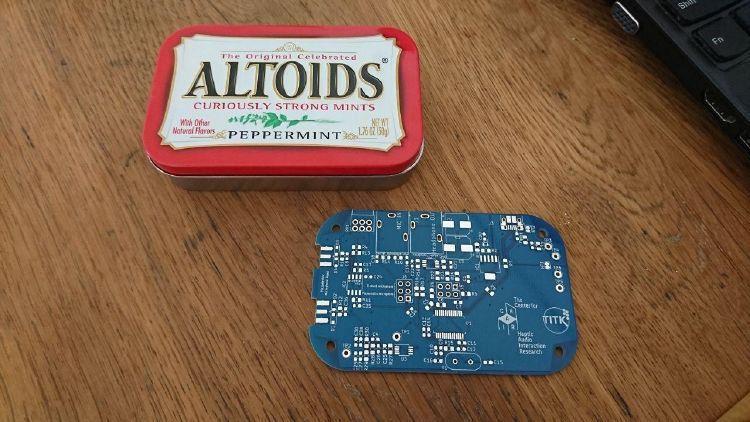| Line 34: | Line 34: | ||
==Syllabus== | ==Syllabus== | ||
# 04-08 | |||
# 04-15 | |||
# 04-22 | |||
# 04-29 | |||
# 05-06 | |||
# 05-13 | |||
# 05-20 | |||
# 05-27 | |||
# 06-03 | |||
# BLOCK: 06-07+06-08 (Friday + Saturday) | |||
# 06-10 NO CLASS | |||
# 06-17 Final Presentation | |||
==References== | ==References== | ||
Revision as of 21:58, 2 April 2019
Lecturer: Max Neupert
Credits: 6 ECTS, 4 SWS
Date: Weekly: 08.04.-17.06. Mondays, 09:15-12:30, and extra block: 07.+08.06. 10:00-16:45
Venue: Marienstraße 7b, Raum 204
First meeting: April 8th 09:15
Description
Autonomous — Collaborative. Auditory interaction on embedded systems
From the ubiquity of smart phones, the internet of things to Eurorack synthesizers: Linux running on miniature computers is playing an ever extending role and is present in every day life as well as in obscure special interest scenes. In the class "Autonomous - Collaborative" we design conceptual and applied interactions with microphones and speakers. The units based on a RaspberryPi can interact and communicate with itself, with other units or a human user. While working on our project we gather experience and knowledge in the fields of electronics, Linux, Pure Data and concepts of sound synthesis, interaction as well as machine learning and software agents.
A RaspberryPi will be lent to you for the class. In addition we will build an universal USB audio interface with preamp for contact microphones. Costs: about 35 EUR.
The class ends on June 18th it is a weekly class with a block module at the end.
Kursbeschreibung
Autonom — Collaboration. Audio-Interaktion auf eingebetteten Systemen
Von der Ubiquität der Smartphones über das Internet-der-Dinge zum Eurorack-Synthesizer: Linux auf Minicomputen spielt eine immer wichtigere Rolle und ist sowohl im Alltag als auch bei Spezialinteressen präsent. Im Kurs "Autonom - Collaboration" gestalten wir konzeptuelle und angewandte Interaktionen mit Mikrofon und Lautsprecher. Die Einheiten basierend auf einem RaspberryPi können so untereinander als auch mit sich selbst oder einem Nutzer interagieren und communizieren. So sammeln wir Erfahrungen und Kenntnisse auf den Gebieten der Elektronik, mit Linux, Pure Data und Konzepten der Klangsynthese, Interaktion sowie Maschinellem Lernen und Agentensystemen.
Ein RaspberryPi wird zur Verfügung gestellt, wir bauen dazu ein universelles USB Audiointerface mit Vorverstärker für Kontaktmikrofone, Kosten: ca 35 EUR.
Kurs geht bis zum 18.6. als wöchentlicher Termin, in der letzten Woche gibt es ein Blockmodul.
Attendance and grading
Strict attendance rule: no more then 3 missed classes accepted. 3 times late counts like one missed class. Late is >15 min after class begun. Presentation of result at the last day of class. Delivery of detailed project documentation (paper, artwork, video, wiki-entry etc.) until the end of the semester. Evaluation: Presentation 30%, documentation 70%
Syllabus
- 04-08
- 04-15
- 04-22
- 04-29
- 05-06
- 05-13
- 05-20
- 05-27
- 06-03
- BLOCK: 06-07+06-08 (Friday + Saturday)
- 06-10 NO CLASS
- 06-17 Final Presentation
References
- Automation/RaspberryPi
- Puckette, Miller: The Theory and Technique of Electronic Music ISBN 981-270077-3 Online Version
- Kreidler, Johannes: Loadbang ISBN 978-3-936000-57-3 Online Version (english, deutsch, español)
- Farnell, Andy: Designing Sound ISBN 0-262-01441-6 obiwannabe.co.uk on Archive.org Code examples
- Zimmer, Fränk: Bang: Pure Data ISBN 3-936000-37-9
- Chung, Bryan WC: Multimedia Programming with Pure Data ISBN 1782164642 source
- Brinkmann, Peter: Making Musical Apps – Real-time audio synthesis on Android and iOS ISBN 978-1-4493-1490-3 (e-Book ISBN 978-1-4493-1489-7 )
- Barkl, Michael: Composition: Pure Data as a Meta-Compositional Instrument ISBN 3838316479
- Matsumura, Sei: Pd Recipe Book ― Pure Data ではじめるサウンドプログラミング ISBN 978-4-86100-780-4
- Miyama, Chikashi: Pure Data チュートリアル&リファレンス ISBN 978-4862671424
- Lyon, Eric: Designing Audio Objects for Max/MSP and Pd ISBN 978-0-89579-715-5
- Hillerson, Tony: Programming Sound with Pure Data: Make Your Apps Come Alive with Dynamic Audio ISBN 978-1-93778-566-6
